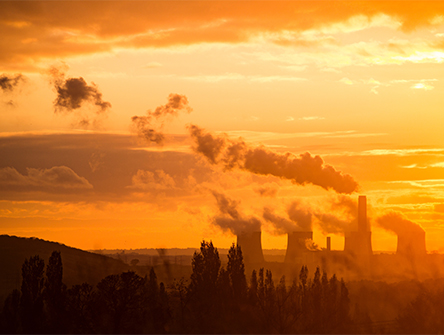Banning fossil fuel advertising
A private member's bill aimed at curbing misleading fossil fuel advertising faces an uphill battle. But Canada's former environment and climate change minister thinks it's one worth fighting.

"You've got to start somewhere," says Catherine McKenna, who served in Justin Trudeau's cabinet from 2015 to 2021.
"We really do need to be very serious when it comes to tackling the climate crisis. And we need people to have facts and not be misled, including about the health impacts of fossil fuels and the climate crisis."
Introduced in the House of Commons by NDP MP Charlie Angus, Bill C-372 proposes restricting misleading fossil fuel advertising like tobacco ads in the 1990s.
Upon tabling the legislation, Angus told reporters that the oil and gas industry's "propaganda" strategy involves promoting its products as clean and part of the climate solution.
"That's like Benson and Hedges telling you that they can help end lung cancer," he said. "This is because big oil has always relied on the big tobacco playbook of delay and disinformation."
According to the Canadian Association of Physicians for the Environment, which supports the bill, the burning of fossil fuels is linked to about 34,000 premature deaths in Canada each year.
McKenna says it's rare for private member's bills to pass. Should this one succeed, it will undoubtedly be challenged, just as the Tobacco Products Control Act was for restricting all forms of tobacco advertising when enacted in 1989.
In its 1995 decision in RJR-MacDonald Inc v A-G Canada, the Supreme Court of Canada found the legislation was an unreasonable limit on freedom of expression.
In 1997, the federal government enacted The Tobacco Act, which restricted the way cigarettes could be advertised and required large warnings on packages. These measures aimed to reduce tobacco use to address the public health crisis.
This time, the top court decided that the law constituted a reasonable limit on freedom of expression that could be justified under section 1 of the Charter of Rights and Freedoms.
Chief Justice Beverley McLachlin wrote for the majority that the advertising law's key provisions were "nothing less than a matter of life or death for millions of people who could be affected."
She also took the tobacco companies to task for their long history of misleading the public.
"The expression at stake — the right to invite consumers to draw an erroneous inference as to the healthfulness of a product that, on the evidence, will almost certainly harm them — is of low value."
McKenna says there are strong parallels between the public impacts of tobacco and fossil fuels.
That parallel extends to the fossil fuel industry's long history of misleading the public about the harms of its products, just as the tobacco industry did.
"We know that the oil and gas industry, over the last 40 to 50 years, has spent significant resources to sow doubt about the scientific consensus on the harms of fossil fuels and its contribution to climate change," McKenna says.
"The sector has also spent a lot of time playing down the role of emissions in accelerating climate change. (For both sectors), the goal was to delay action and protect their profits."
Simon Potter, a lawyer at Simon Potter Inc. in Montreal, sees other similarities. He says if this legislation were to pass, it would be another instance of a government thinking it can attack a problem by getting people not to talk about it.
A former president of the Canadian Bar Association, Potter represented Imperial Tobacco in its 2007 challenge of federal tobacco advertising laws.
That saw the country's largest tobacco companies argue that the legislation was so vague it could be interpreted as a complete ban on advertising, which violated their freedom of expression.
Potter says the same is true of Bill C-372. "This is so utterly vastly drafted, it is just inviting being overturned," he says. "All of the jurisprudence relating to expression, including the tobacco jurisprudence, would indicate that legislation which resembles this bill in any way would be found to be extremely overbroad and void for vagueness."
He also doesn't think it would meet the burden of proof under the Oakes test.
Further, Potter says existing legislation already criminalizes misleading the public knowingly, pointing to the federal Competition Act and provincial consumer protection laws.
Environmental groups have turned to competition law to fight the fossil fuel sector. The Competition Bureau is currently investigating a complaint about whether Pathways Alliance, a group of oil and gas producers, misled the public in its advertising campaign, "Let's clear the air," which promoted their plan to achieve net-zero emissions by 2050.
However, McKenna, a competition lawyer, says the industry's practices go beyond the bureau's ability to deal with them piecemeal.
"This isn't one or two cases of misleading advertising. This is an industry that has been lying about the fact that fossil fuels cause climate change for decades. It's a trend for the industry that wants to continue burning its products while people pay the price," she says.
"And now they're in a different phase, where they're trying to create the perception that they're part of the climate solution, when they're actually a major part of the problem."
Greenwashing makes it appear that more is being done to address the climate crisis collectively than is the case, McKenna says. Meanwhile, emissions continue to rise when they need to decrease by half by 2030.
Responding to allegations of greenwashing, Lisa Baiton, CEO of the Canadian Association of Petroleum Producers, told the Toronto Star the "label discourages real solutions to the world's energy crisis."
But as the window for climate action closes, the industry's efforts are having an impact on public opinion. McKenna points to a decline in the percentage of people who believe the climate crisis is man-made and the result of burning fossil fuels.
"That's a problem because we need to take serious action on climate change, but public policy does require public buy-in."
While some critics have tried to portray Bill C-372 as radical, other jurisdictions have already taken misleading advertising to task.
In 2021, Amsterdam became the first city to ban ads from fossil fuel companies. In 2022, France became the first European country to do so. In January, the European Parliament adopted new legislation banning corporate greenwashing and false environmental claims.
The Intergovernmental Panel on Climate Change has acknowledged the role of corporations in derailing climate action. And as part of COP27, the UN's High-Level Expert Group on the Net-Zero Emissions Commitments of Non-State Entities, chaired by McKenna, released a report calling for a red line to be drawn around greenwashing.
"I think everybody in Canada is aware that fossil fuels contribute to climate change," says Potter, adding nothing in the bill will lessen the impacts of extreme weather events and wildfires.
Instead of trying to pass "feel good legislation" that's only going to create a huge Charter case, those efforts could be better spent actually dealing with the climate crisis.
"If we get into the business of the government deciding what we can hear and say so that it will not lose public support for its measures, we're in bad shape."


